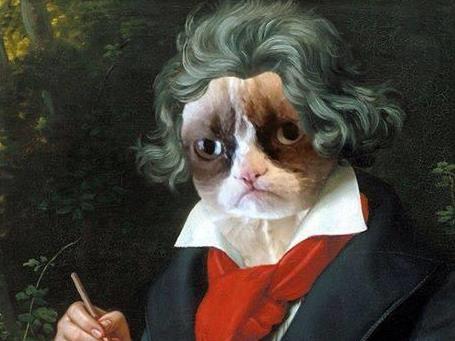Grumpy cat as Beethoven, Image via Tumblr
As tertiary education and the wider content of national curricula become the rope in the middle of a political tug-of-war, it’s timely to ask where this debate sits in the larger scheme of things. It’s often stated that those who ignore the lessons of history are doomed to repeat it. So how will we be remembered? Will future historians view this current age as one of unprecedented enlightenment, or will it be ranked alongside the Dark Ages as a time of lost opportunity and widespread cultural regression? Is the combination of the exponential advance of technology and the rise of the superficial the equivalent of a cultural cliff towards which society is racing, lemming-like, oblivious to its perils?
Culture is not a commodity that can be traded away. It is a birthright. Our culture defines, connects and enhances us. Nevertheless, the imbuing of cultural depth that is an assumed part of, say, a European upbringing has far greater hurdles to surmount in Australia. Our relative youth as a country leaves our still forming sense of self at the mercy of global voices which are older, louder and more pervasive. But having a strong sense of self is surely predicated on knowing where we sit in the world. An understanding of our history and the artistic and cultural influences that buffet us provides us with a frame of reference to interpret the world around us, and the society in which we operate and to which we wish to contribute.
Artistic expression was one of the fundamental binding forces of early societies. Creativity and innovation, along with genetics, enabled us to descend from the trees and start to shape the world around us. Early civilisations interpreted their world through art, music and folklore, just as subsequent generations have done. Why then is the pursuit of, and exposure to, artistic knowledge and facility apparently viewed as a kind of luxury cultural add-on? There is a wealth of research that reinforces the intellectual, social and personal benefits gained from early education in a broad artistic palette. We get smarter and become better human beings.
There is, however, much more to it than that. It was Sophocles who stated that, ‘Whoever neglects the arts when he is young has lost the past and is dead to the future.’
In our modern world, it may be that not only are we potentially dead to the future, but that from a cultural perspective, our future may be dead.
We are surrounded by a continuous stream of ‘entertainment’, mostly digital, where the concept of excellence is obliterated in an infinite cascade of mediocrity.
There’s an internet provider advertising that it brings together the brightest minds to create the fastest internet speeds, just so that we can watch others do really stupid things on YouTube. It would be even more amusing if it wasn’t so true. We are allowing ourselves to be dumbed down in our glorification of the trivial and the superficial. In our race to embrace the latest YouTube fad, we are contributing to our own progressive cultural illiteracy. It’s the equivalent of eschewing the masterworks of Shakespeare to fill our library shelves with row upon row of penny dreadfuls.
The arts allow us to explore the human condition, whether through visual media, music, theatre, opera, dance or any of the burgeoning digital platforms. They allow us to explore what lies within us, while simultaneously allowing us to question our place in society and in the universe at large. The arts, in all their forms, reflect parts of ourselves back at us. In a way, the arts are the ultimate selfie, revealing a picture with roots that burrow deep into our cultural, social, intellectual and spiritual foundations. An understanding of arts and culture provide us with a filter that allows us to separate the treasure from the trash. In this age of media saturation and a total absence of quality control, those filters start to disappear. We live in an age of immediate gratification, where access to arts content, so easily acquired at the touch of a button or swipe of finger on a touchscreen, can also be just as quickly glossed over, or deleted. Everything has the same value, in effect, rendering everything valueless. We also live in an age of distraction, where our time is a commodity to be exploited and consumed by marketing companies. We spend so much of our time deflecting things we don’t want to know about that the message we are trying to enjoy is well and truly lost in the medium.
One wonders whether Ludwig van Beethoven, as he walked in solitude through the Vienna Woods, contemplating his Sixth Symphony, would have completed it if he had spent half his walk sending texts on his mobile and checking his Facebook profile, and deleting spam email? Would Michelangelo ever have finished the Sistine Chapel under the same conditions?
In the avalanche of digital content, much of it driven by multinational commercial interests, the voice of the lone genius, the solitary visionary, the talented individual is hard to distinguish from the prevailing white noise of the dross that surrounds it. Anybody can be heard now, whether their message is worth hearing or not. Without a solid arts education to guide us, we have little value of comparison and we lose our appreciation of what is truly special. With culture, if you don’t know what you have, how can you possible know what it’s worth? If we don’t value it, we risk losing it, and if we lose our true sense of culture, then we are lost along with it. And just like the lemmings, that final rush over the cultural cliff really is a point of no return.





